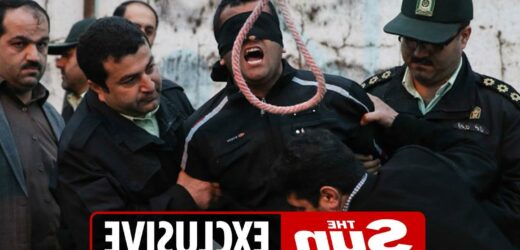AROUND the world, the justice system doesn't come much more barbaric than in Iran.
Its "eye for an eye" laws – known as Qisas – sees prisoners subject to brutal punishments designed to inflict as much pain as possible in retaliation, including having eyes gouged out, hands chopped off and even the mass, public hangings.
And disturbingly, the victim's families are often encourage to take part in executions themselves under the law.
In one chilling case, a man was this month sentenced to be blinded after he left a neighbour unable to see in one eye during a fight back in 2018.
Iran authorities have also been known to carry out amputations as a form of punishment, with one convicted thief having his hand sliced off in front of other horrified prisoners.
Meanwhile, inmate Hadi Rostami faces having four fingers amputated after being convicted of robbery in 2019 in what has been branded a "grossly unfair" trial marred by torture-tainted "confessions" by Amnesty International.
In response to peaceful protests the 33-year-old has held against his treatment in prison, he was flogged 60 times for “disrupting prison order”.
Alongside other global human rights organisations, Amnesty has repeatedly called for Iran to halt such punishments which are against international law.
Amnesty International’s Iran Researcher Raha Bahreini told The Sun Online: “Punishing someone by deliberately blinding them is an unspeakably cruel and shocking act.
"This punishment exposes the utter brutality of Iran’s justice system and underlines the Iranian authorities’ shocking disregard for basic humanity.
"Meting out cruel and inhuman retribution punishments is not justice. Blinding, like stoning, amputation and flogging, is a form of corporal punishment prohibited by international law.
"Such punishments should not be carried out under any circumstances."
Iran is also known for its vile executions, and Middle East country comes second only to China when the number of executions worldwide are stacked up – but with a much smaller population.
Children as young as 12 are handed the death penalty – which international law forbids.
Under its Islamic Penal Code, a death sentence can be handed down for crimes such as kidnapping, adultery, drinking alcohol and political offences as well as murder.
Just this year, at least 246 people have been executed, figures from Iran Human Rights show – but it's believed the actual figure could be much higher as many are done in secret.
Meting out cruel and inhuman retribution punishments is not justice.
Maryam Karimi was executed by her own daughter just this year after she killed her abusive husband with the help of her father after he refused to consent to a
divorce.
Her daughter, who was six when she killed her husband, took part in the execution after reportedly refusing to forgive her or accept "Diya" (blood money).
Mahmood Amiry-Moghaddam, director of campaign group Iran Human Rights, said: “The Islamic Republic laws make a girl whose father was murdered when she was a child, the executioner of her own mother.
"The Islamic Republic is the leading promoter of violence in Iranian society today.”
Following the execution, Maryam’s father Ebrahim was brought in by authorities to see her corpse hanging on the noose.
Torture is also believed to rife in Iran's prisons, with electric shocks, floggings, water boarding and sexual violence used on prisoners, according to human rights groups.
Prisoners have before told of being subjected to cruel torture in jail as cops allegedly hold guns to their heads and kick them to the point they throw up blood.
'DISREGARD FOR BASIC HUMANITY'
In 2010, Shirin Alam Hooli was secretly executed after being charged with "enmity against God" for joining PEJAK, a Kurdish opposition group by the Revolutionary Court.
Before her death, she described months of physical and mental torture in a letter.
“The tortures you used against me, has become my nightmare. I am suffering day and night because of the tortures I underwent," she wrote.
"I was hit on the head and got injured in the head. My headaches are so severe that I don’t understand what is going on. I suffer for hours and finally, my nose bleeds due to severe pain.
"One day, during the interrogation, he kicked me so hard in the stomach that I instantly threw up blood.
"Another day, one of the interrogators came to me. He was the only interrogator I could see because in other times, I was blindfolded.
"He asked me irrelevant questions. When he did not get any answers from me, he pulled out and pointed his gun at my head, and said, ‘You must answer the questions I ask you. I know you are a member of the PEJAK; you are a terrorist'."
In most cases, prisoners hit with the death penalty are hanged.
But often, this is not done on a drop, where death comes quick after the neck is broken and instead construction cranes are used.
The condemned person is hoisted up on a neck noose and strangled in a slow and agonising way.
Crowds are encouraged to watch and some executions are televised – with several people sometimes hanged at one time.
In a sick twist to the brutal mass hangings carried out, those awaiting execution have been made to watch others die.
One woman on her way to the to the gallows, Zahra Ismaili, suffered a heart attack after seeing 16 men hang in front of her – but her lifeless body was strung up anyway.
Despite many cases being condemned on a global scale, Iran pushes ahead with its brutal death penalty regime.
In 2014, Reyhaneh Jabbari was executed for killing a man in self defence against rape.
The 26-year-old stabbed Morteza Abdolali Sarbandi after he tried to assault her, and was arrested before being force to suffer months of solitary confinement and torture.
'THE BUTCHER'
Global appeal and lobbies from the likes of Amnesty International, the United Nations and the European Union for Reyhaneh to be spared the death penalty fell on deaf ears and despite her family having the power to halt the execution, she was hanged.
Amnesty branded her death as "a bloody stain on Iran’s human rights record".
Shocking executions and barbaric punishments continue to be carried out under hardline cleric Ebrahim Raisi who – despite activists claiming he has a bloody history steeped in murder – won a landslide victory to become president earlier this year.
In the past, Raisi – known by some as The Butcher – has allegedly ordered the torture of pregnant women, had prisoners thrown off cliffs, and had people flogged with electric cords.
He earned his sick nickname over his alleged involvement in the mass execution of political prisoners in the 1980s.
Some 30,000 men, women and children held in prisons across Iran were linked up and shot against a wall within just a few months, according to those battling to oust the ultra conservative regime.
It's reported Raisi was a key member of the so-called "Death Commission" which ordered those people to be killed in the 1988 massacre – which Iran has never acknowledged.
We pay for your stories!
Do you have a story for The Sun news desk?
Email us at [email protected] or call 0207 782 4104. You can WhatsApp us on 07423 720 250. We pay for videos too.
Click here to upload yours.
Click here to get The Sun newspaper delivered for FREE for the next six weeks.
Source: Read Full Article







